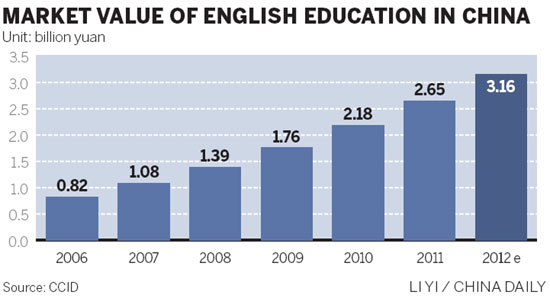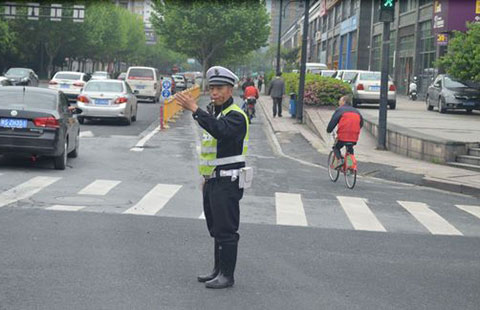English centers chalking up record business
By Wang Wen (China Daily) Updated: 2012-11-03 07:55Wang Wawa, a 7-year-old girl living in Shijiazhuang, Hebei province, started to learn math with textbooks in English from the United States in September.
Wang spends two hours a week at English classes, which cost her parents more than 10,000 yuan ($1,587) a year.

"It is expensive, but worth it," said Wang's mother Zhang Xue, a 32-year-old art teacher at a local primary school.
"I believe the US textbooks will help Wawa get used to classes in that country," said Zhang. "It would be good for her to study abroad in the future."
Zhang is just a typical parent in China, more and more of whom are sending their children to study abroad at a young age. Statistics from the US Department of Homeland Security show that the number of Chinese middle school students learning in the US grew from 65 in the 2005 to 6,725 in 2010.
Although the number is still much lower than Chinese college students in the US, the growth is large.
And as these parents plan the future of their offspring, they are also helping to boost China's high-end children's English education business.
What sets the high-end companies apart from their traditional counterparts is that they import textbooks, teaching modes and even teachers directly from English-speaking countries.
Classes similar to those in primary schools in the US attract Chinese parents, who want their children to feel at home as soon possible when they start studying stateside.
Best Learning English is one of these companies. Established in 2010, it now has 30 training centers and more than 10,000 students across China.
"We plan to expand to 100 training centers by 2015," said its CEO Wang Ning.
Riverdeep International Education Inc, Best Learning's major competitor, has also enjoyed rapid growth, expanding to more than 140 training centers since 2007.
The fast expansion of high-end children's English education is a result of a more global outlook among China's new generation of parents.
"Young Chinese parents care about whether their children have an international outlook," said Zhang Yuanmeng, director of China Research Center for Children's Industry.
Zhang said these parents choose high-end English education - even if their children will not study abroad in the future - due to globalization.
"The market for high-end English education companies is huge, as Chinese parents believe their children have to deal with competitors all over the world when they grow up," she said.
And this is a sector which is proving attractive to investors. Best Learning English attracted 100 million yuan in its first round of financing in October.
However, these companies still need to overcome a number of problems if they want to ensure their further growth.
"Human resource management is the primary problem for growing English education companies," said Zhang from the China Research Center for Children's Industry.
The business requires high-quality teachers, not only with the language skills, but also teaching skills and an understanding of Western culture, she said.
"The lack of teachers in big cities is more obvious, since the market is larger there," she added.
But the good news is that Chinese education companies are recruiting more teachers from English-speaking countries who are looking for work due to the economic crisis in the West, some business insiders said.
wangwen@chinadaily.com.cn
- China renews blue alert for rainstorm
- IMF: Economic restructuring 'desirable'
- Doctor severely wounded by ex-patient
- Speedier delivery to aid transplants
- 118 flights delayed by storms in Guangzhou
- Taiwan's participation in WHA based on One China principle
- Beijing's five-year plan: Cut population, boost infrastructure
- Inspection teams to cover all of military
- Disney promises 'safe, pleasing service of high quality'
- Palace Museum discovers relics buried for over 600 years








